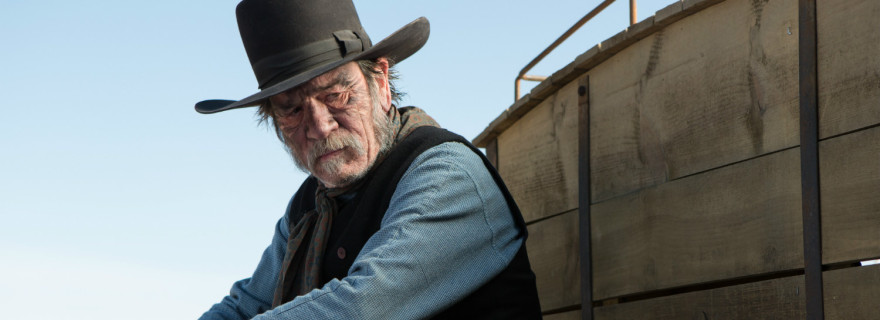'The Homesman'
Movie Rating:
3
Returning to the director’s chair for the first time in almost a decade, Tommy Lee Jones has gone full Western on us. His take on the genre is as cranky, restless, unpredictable, miserable and confusingly angry as the actor/director himself appears to be in real life. On that level, it’s a very personal Western and certainly un film de Tommy Lee Jones. Unfortunately, the episodic narrative has a tendency to branch off into misguided and confused passages as often as it stumbles onto brilliant ones.
Surprisingly, the film doesn’t open on the grizzled Western landscape of Tommy Lee Jones’ face, but instead starts with Hilary Swank’s strong single woman living in an isolated farm community that should one day become Nebraska. She fails in securing herself a husband by presenting the relationship as a business opportunity rather than any form of romantic attachment, which appears to be a reoccurring dilemma for the woman who most men find too plain or bossy. After pulling herself together again, Swank agrees to transport three deeply troubled local women (Miranda Otto, Grace Gummer, Sonja Richter) to a mental hospital across the country. To help her with the difficult journey, Swank essentially blackmails a real Western scallywag played by Jones into accompanying her. A bond forms between the two over the tough travels. You know, that old story, only with one big unexpected twist that I wouldn’t dare to give away.
The vision of the Old West that Jones has whipped up is easily one of the most harsh and uncompromising ever produced. There’s no romance to this Western and certainly no heroism. It’s a dreary, horrible, untamed land in which only the most desperate of souls can survive. The troubled women who serve as cargo for the film’s journey seem to have lost their minds purely from the unpleasantness of the landscape and lifestyle. Though one would never expect anything other than old-timey manliness from a movie made by Tommy Lee Jones, it has an intriguing feminist streak to the story. It springs both from the horrifically inhumane treatment of women in the era as well as in Swank’s character, who is stronger and more independent and defiant than any man on screen. For a while, it appears that the movie might devolve into mismatched road romance cliché, but then Jones drops a bomb of a twist that changes everything. The film goes thrillingly off the rails and down dark paths before sadly diverting back to a pretty rote and conventional conclusion, including a cameo from Meryl Streep (Gummer’s real-life mother).
It’s a shame that Jones wasn’t quite willing to let his film fully transform into a journey into the heart of darkness as it seems like it might while teetering towards the end. A wild and insane anti-Western got lost when he decided to tidy up the conclusion, but thankfully the film is strong enough to qualify as an interesting work despite its confused nature. As a director, Jones has a knack for creating vividly harsh imagery over barren landscapes, and his screen pairing with Hilary Swank yields some of the best work that both actors have ever done. The tone shifts throughout from the darkly comedic to the just plain disturbingly dark in a way that will alienate plenty of viewers. Those cracked and cynical enough in their worldview to stick around will likely be let down when the filmmaker goes soft at the finish line.
‘The Homesman’ is a difficult film that challenges viewers, and that’s certainly an admirable achievement for Jones to be proud of, even if he eventually loses his way.



